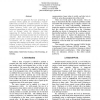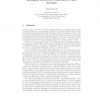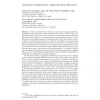2217 search results - page 34 / 444 » Learning from Collective Behavior |
ICRA
2003
IEEE
15 years 7 months ago
2003
IEEE
We present an approach that uses Q-learning on individual robotic agents, for coordinating a missiontasked team of robots in a complex scenario. To reduce the size of the state sp...
139
click to vote
ESWS
2007
Springer
15 years 8 months ago
2007
Springer
ct In recent years, the use of streamed digital video as a teaching and learning resource has become an increasingly attractive option for many educators as an innovation which exp...
92
Voted
ATAL
2008
Springer
15 years 4 months ago
2008
Springer
When the same set of people interact frequently with one another, they grow to think more and more along the same lines, a phenomenon we call "collective cognitive convergenc...
105
click to vote
EUROPAR
2007
Springer
15 years 8 months ago
2007
Springer
Abstract. Understanding program behavior is at the foundation of program optimization. Techniques for automatic recognition of program constructs (from now on, computational kernel...
147
click to vote
AAMAS
2004
Springer
15 years 2 months ago
2004
Springer
Multi-agent teamwork is critical in a large number of agent applications, including training, education, virtual enterprises and collective robotics. The complex interactions of ag...



